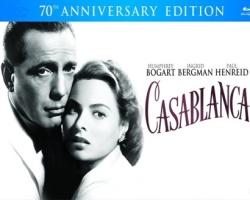Casablanca is one of those films I could watch over and over and never get tired of it. The dialogue, the acting, the sophisticated storyline, the good guy coming out on top in the end…Most of all, I love watching Humphrey Bogart play the role of Rick Blaine, the ultimate I-stick-my-neck-out-for-no-one cynic. Bogey is the epitome of cool.
Casablanca takes place in the Moroccan town by the same name during the onset of World War II. The Nazis are sweeping through Europe, forcing thousands to flee their homes. Many wind up in Casablanca in French-controlled Morocco, hoping one day to obtain the travel documents necessary to journey to America and out of the reach of the Nazi army. Rick Blaine, a fugitive American, runs a popular café in Casablanca and appears resigned to the fact he will live out the rest of his days in this purgatorial city. Life seems comfortably numb for Rick until he finds himself in possession of two letters of transit and playing host at the café to Victor Lazlo—the leader of the resistance movement in Europe—and Victor’s wife, the fair Ilsa Lund. We learn Rick and Ilsa were madly in love years back while in Paris, right before the Nazis moved in to occupy France. Ilsa left Rick brokenhearted at the train station when they were supposed to flee from Paris together. Seeing her again conjures a host of hurt feelings and bitterness for Rick, as well as creates an incredible dilemma for him. Does he give or sell the letters of transit to Lazlo, thereby ensuring the resistance movement against the Nazis will go on? Does he try to win Ilsa back and use the letters himself to flee Casablanca with his long-lost love? Or does he maintain his cool indifference and simply not get involved?
This film, with all its wonderful acting and many memorable lines of dialogue, provides a perfect illustration of the idea that the right thing to do is hardly ever the easy thing to do. Obviously, the right thing for Rick to do is to give Lazlo the letters so he can travel safely to America. However, he has to overcome so many obstacles that make the right thing very difficult—the biggest being his anger and bitterness toward Ilsa. He does eventually do the right thing, although through somewhat sneaky and underhanded means, and good does finally triumph over evil and Rick chooses the right side.
Living in 21st century America, there are no simple answers, and doing the right thing is rarely easy. Far too often, wrong actions are rewarded, and as the saying goes, “No good deed goes unpunished.” So how do we encourage our students to do what’s right when there are few tangible benefits to doing so?
We need to remind them that any earthly reward is just an added bonus; our true rewards await us in the next life. It may appear that our good deeds never get rewarded, but we need to remember our heavenly Father is watching. He knows our hearts and our intentions, and He will reward us one day when this world and life have passed away. We ought to do the right thing because it’s the right thing to do, not because we stand to gain from it.
Take it further (Questions to engage students):
Have you recently faced a moral dilemma? Did you do the right thing? What was the outcome?
Have you ever been tempted to do the wrong thing because it was the easier thing? What did you do? What was the outcome? How did you feel about your actions?
Ryan M. Blanck is the author of Engaging the Media. Follow him on Twitter and like him on Facebook.




